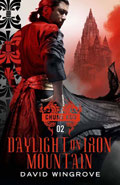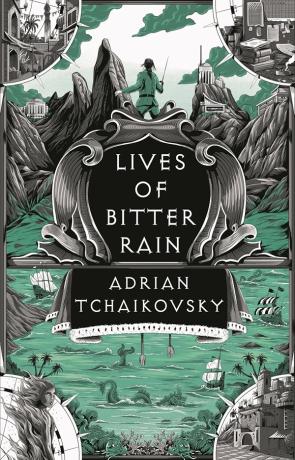Interview with David Wingrove

Today marks the launch of Daylight on Iron Mountain, the 2nd volume in David Wingrove's re-imagined Chung Kuo series, an incredible future vision and one which promises to be an absolute epic, unmissable series.
I was lucky enough to be granted an interview with David Wingrove which gives a great insight into the series.
Ant You originally started writing Chung Kuo way back in the 1980's and many of the ideas presented seem somewhat prophetic, where did you get these ideas from?
David The original short story, "A Perfect Art" had nothing Chinese about it at all, only as it grew and grew I needed a future backdrop for my tale. Years before, while still at school, I'd done a project on the Opium Wars - China in the 1840s - and had grown fascinated with all things Chinese. Therefore a future world run by the Chinese seemed sufficiently strange and alien to give the thing a bit of genuine exotic flavor. But, as I began to rewrite, the background became the foreground, and, realizing I was on to something, I began to research it heavily. I was also encouraged, I guess, by my readings in the SF field, while I was working on TRILLION YEAR SPREE, the History of Science Fiction, with Brian Aldiss - by the complete dearth of any other SF novels using a similar background. I suppose I reckoned that even if it wasn't entirely feasible, it was original, having the Chinese in charge, but as I researched more and more I began to believe my own scenario and tried to make sense of how it could come about. It was also five years after Deng Shao Ping had relaxed the laws about selling produce in the market, and you could glimpse China beginning to open up to trade, which was the very much beginning of what we see today.
Ant: What made you decide to go to the epic lengths of completely overhauling the series into a 20 book epic?
David I guess that I never considered the thing properly finished. Because of contractual matters, I had to cram the final two parts into one volume, and the thing suffered hugely because of that. I don't think I pleased anyone - and I'm talking now of the eighth volume of the original sequence, THE MARRIAGE OF THE LIVING DARK. A lot of my readers felt let down by that ending, and I don't blame them. You have a responsibility to readers - especially to giving them a satisfactory and deeply satisfying finale - one that not only feels right in your head, intellectually, but one which gives you emotional catharsis. As it was, it didn't do either. Getting that right - and also writing a "How we got there from here" prequel (SON OF HEAVEN and DAYLIGHT ON IRON MOUNTAIN) - became almost an obsession with me. I also wanted to trim and polish what already existed, to make the whole thing more readable and satisfying. The total overhaul therefore grew out of getting the thing properly topped and tailed. But I promise, I'll get it right this time round.
Ant: It is clear from the series that you have a deep knowledge of China and it's people, how and why did you learn about this rich and ancient culture?
David Let me refer back to my earlier answer. When I finally decided that the Chinese background was in fact what my story was about - the whole idea of the Tao at war with itself - I began researching China and things Chinese like a mad man, with the aim of getting the detail right. Over the next seven years - and in the twenty years since then - I must have read five or six hundred books on China, on every topic I could lay my hands on. Getting into a Chinese mindset was, obviously, important, but it was also fun and gave the story a lot of richness. I think you'll see that from Book Three, THE MIDDLE KINGDOM onward - when it comes out next Summer. And I got some things right on the head. In the opening page of THE MIDDLE KINGDOM, the T'ang, or emperor, Li Shai Tung, is looking down at the world, Chung Kuo, from his Heavenly Palace, Tiangong, 160,000 Chinese miles above the earth, in geostationary orbit. And now, 22 years after it was published in 1989, the Chinese have finally put their first space module in orbit - the first part of their space station. And its name? Tiangong! "Heavenly Palace"!
Ant: Looking at the state of the world today, do you still see China becoming the world's super-power?
David I think it's an absolute certainty. Oh, Russia and India and, of course, the US of A, will still be competitors on the world stage, but China will dominate. Unless the whole world economy crashes before it happens. In which case it doesn't really matter. But at present we are sleepwalking our way into the future, with none of our politicians really grasping what changes lie ahead in the next ten to twenty years.
Ant: In Daylight on Iron Mountain the vast Empire is ruled by one man as a form of Monarchy do you see this as more likely than the existing communist type of government?
David No. Which is why I show the emergence of the Seven in that book. It's the old thing of one length of bamboo being (relatively) easy to snap, while seven lengths of bamboo placed tgether are almost unbreakable. Although Chung Kuo, in its entirety - which covers 60 years of this future world - does show how even the solidity of Seven can, over a long period, be whittled down to a single ruler once again.
Ant: If you could work with any author who would it be?
David Working with Brian Aldiss on TRILLION YEAR SPREE was about as good as it gets, but in terms of fiction? Mike Cobley, maybe. Mike's been a great friend for twenty odd years now and I've watched him come through the ranks and begin to produce some memorable stuff. I'd love to write a space opera with Mike - something BIG, but in a single volume.
Ant: How do you conceive your plot ideas?
David Endless different ways. From press cuttings, snippets in documentaries, from books I've been reading? and as far as Chung Kuo is concerned, just reading the Cambridge University history of China gave me endless plot strands. You don't have to invent this stuff - it's already happened. All you have to do is 'disguise' them. Creative theft, I call it.
Ant: Who do you see as your influences? are these also your favourite authors?
David Within the field? Brian Aldiss. Ursula LeGuin. John Crowley. Robert Silverberg. Keith Roberts, Richard Cowper, Frank Herbert and - probably more than anyone else - Philip K. Dick. I've even got a five-sixths finished novel I wrote in Dick's style called KING OF PAIN, which I'll one day finish and rework, but yes, within the field those are my favourite authors. Outside the field? Dostoevsky, Thomas Hardy, DH Lawrence, Herman Melville, Emile Zola,Thomas Mann, John Fowles, William Golding, Hermann Hesse, Patrick O'Brien. Especially the last.
Ant: What question have you always wanted to be asked in an interview? How would you answer that question?
David That's very easy (but hey, thanks) - You spent seven years at University, David, writing a doctorate on Hardy, Lawrence and Golding. Why didn't you become a mainstream writer?
And my answer?
I am. I'm writing this big twelve volume novel called AN ENGLISH BOY, three books of which are written. But back-tracking, I do genuinely love science fiction. And I'm not ashamed of being termed a science fiction writer. It's not SF of Sci-Fi or speculative fiction that I write. It's Science Fiction. Say it loud and proud. The best damn genre in the known universe.
Daylight on Iron Mountain is out in all good book shops and online stores today.
